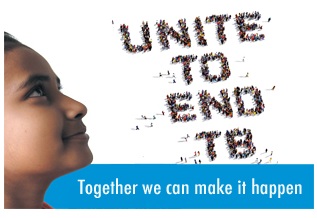
In advance of World TB Day, to be observed on March 24, the World Health Organization (WHO) is calling on countries and partners to "Unite to End Tuberculosis".
The call comes as we enter the era of the Sustainable Development Goals (SDGs). Ending tuberculosis (TB) by 2030 is a target of the SDGs and the goal of the WHO End TB Strategy.
That is an ambitious aim. While there has been significant progress in the fight against TB, with 43 million lives saved since 2000, the battle is only half-won: over 4 000 people lose their lives each day to this leading infectious disease. Many of the communities that are most burdened by tuberculosis are those that are poor, vulnerable and marginalized.
Greater collaboration needed
Ending TB will only be achieved with greater collaboration within and across governments, and with partners from civil society, communities, researchers, the private sector and development agencies. This means taking a whole-of-society and multidisciplinary approach, in the context of universal health coverage.
Momentum is growing at country and community levels – including in the 30 countries with the highest TB burden (over 85% of the global burden). A number of countries are strengthening the strategic agendas of their TB programmes, by adopting newer tools, extending access to care and linking with other parts of government to reduce the financial costs borne by patients. Other countries are partnering with researchers to speed development of diagnostic tests, drugs and vaccines, and to improve delivery.
Country progress on TB
For example, India which is home to more people ill with TB and multidrug-resistant TB (MDR-TB) than any other country, has committed to achieving universal access to TB care with its campaign for a TB-Free India. The Ministry of Health and Family Welfare is expanding its capacity to test patients rapidly for drug-resistant TB and is initiating use of bedaquiline, a new, WHO-recommended drug in MDR-TB treatment. In addition, by making TB case notification mandatory in 2012 and by intensifying efforts to engage the private sector, case notifications rose 29% in 2014 alone.
In working towards universal health coverage, South Africa has greatly expanded access to Xpert MTB/RIF, a WHO-recommended rapid molecular test for TB and drug-resistant TB. South Africa has the largest number of people living with HIV who are receiving TB preventive treatment in the world.
In Thailand, where a large percentage of the population has access to health services at modest cost, efforts are focusing on ensuring that all residents – including migrants – have access to TB treatment.
In the Russian Federation, a high-level working group across government institutions has strengthened TB policies over the last 15 years. Since 2005, Russia reports that TB mortality rate has dropped more than 50%, and TB notifications have dropped 20%. WHO will work with the Ministry of Health in 2016 to assess these data and help assess the factors leading to such a decline.
Brazil and Viet Nam, both with effective basic TB services, are investing in research efforts to drive down the TB burden. Brazil has formed a national network of TB researchers, REDE-TB, which is working on basic science, clinical trials, and operational research priorities. Viet Nam has formed VICTORY (“Viet Nam Integrated Centre for Tuberculosis and Respirology Research”), a research partnership that is initiating a TB prevalence survey and developing tools to prioritize interventions for MDR-TB.
Challenges remain
Despite these advances, formidable challenges remain including fragile health systems, human resource and financial constraints, and the serious co-epidemics with HIV, diabetes, and tobacco use.
MDR-TB is another critical challenge. Urgent and effective action to address antimicrobial resistance is key to ending TB by 2030. So are increased investments, as the global tuberculosis response remains underfunded for both implementation and research.
WHO is committed to continuing its work with countries and partners around the world to address these challenges and to accelerate collective action to end the TB epidemic altogether.
Key TB Facts
Note to editors:
The 20 countries with the highest absolute burden of disease (estimated number of new TB cases per year): Bangladesh, Brazil, China, Democratic People’s Republic of Korea, Democratic Republic of Congo, Ethiopia, India, Indonesia, Kenya, Mozambique, Myanmar, Nigeria, Pakistan, Papua New Guinea, Philippines, Russian Federation, South Africa, Thailand, the United Republic of Tanzania, and Viet Nam.
The 10 countries with the highest incidence rates (estimated number of new TB cases /100 000), and at least 10 000 estimated new TB cases per year: Angola, Cambodia, Central African Republic, Congo, Lesotho, Liberia, Namibia, Sierra Leone, Zambia and Zimbabwe.
Source: WHO